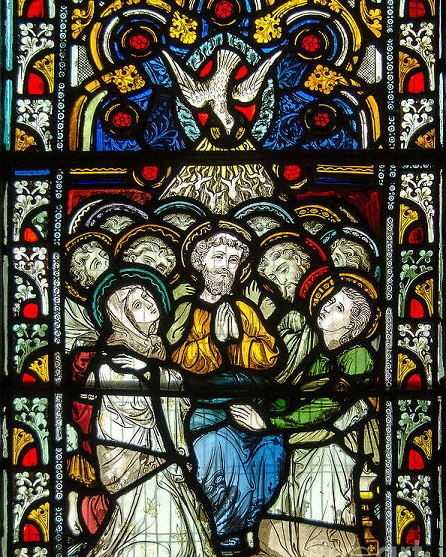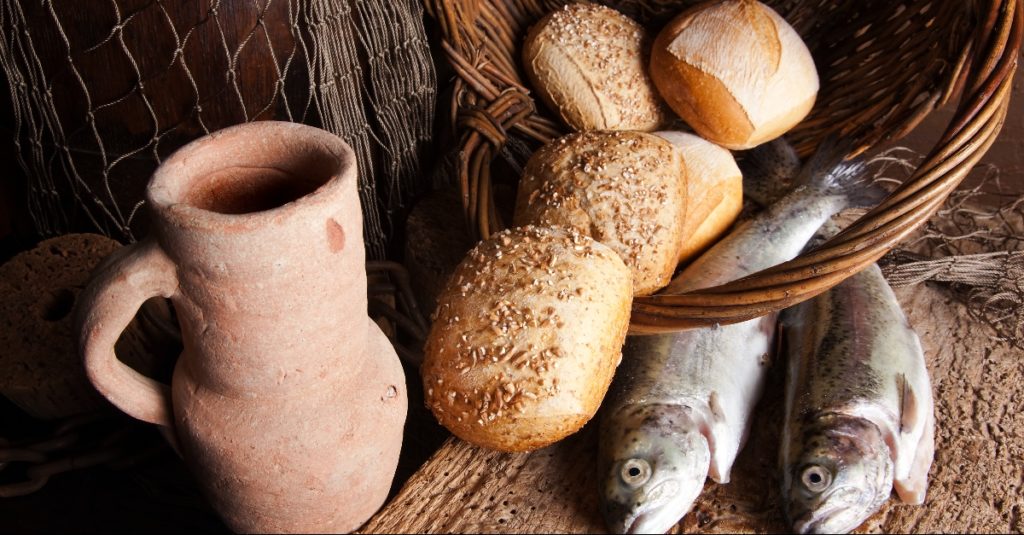Readings: Isaiah 6:1–8 | Acts 2:14a, 22–36 | John 3:1-17
Text: John 3:1-17
On this celebration of the Holy Trinity, we encounter a great mystery of the Christian faith—the nature of God. Many men have sought and still seek to know God, to be part of something greater than themselves and to connect with the unseen.

The 11th century Benedictine monk, Anselm of Canterbury, attempted in his day to write single proof for the existence of God. His idea was that God is the highest thing that human understanding can conceive of. He wrote, “Hence, there is no doubt that there exists a being, than which nothing greater can be conceived, and it exists both in the understanding and in reality.” (Proslogion) This excited him, because in philosophical terms, he had a handle on the truth of God’s existence.
Writing in the first quarter of the 20th century, Ernest Holmes, devised a philosophy based on the Bible, called Science of Mind, in which his approach to God is this:
“I believe, that Infinite Spirit, God, or whatever symbol is used to denote the All-Inclusive Intelligent Power running the Universe, has always existed—no beginning and no end. Infinite.” (Ernest Holmes, Science of Mind (1926), pp. 4)
Holmes acknowledges that God is infinite, eternal, and running the universe, but man can only make contact with the Infinite through devoting himself to study (a.k.a. buying his books) and contemplation.
The ancient religion of Hinduism believes the ultimate in the universe is the Supreme Soul or Brahman, as explained in a story in one of their sacred texts called the Skanda Purana:
“This knowledge of Brahman can only come to that person who is unattached to anything in the world. It is true that the disciple seeks a guru to gain knowledge. However if all the desires lurking in the heart are eliminated, then this knowledge automatically manifests in the heart. Such a person will attain Brahman.”[1]
So for the Hindu, knowing the Supreme can only come to a person who prepares themselves by eliminating all desire first.
Suffice to say, man has a lot of assertions about God—most of them very complex and open to only the elite who can attain to the “right” understanding.

Nicodemus comes to Jesus by night with his own kind of assertions: “Rabbi, we know that you are a teacher come from God, for no one can do these signs that you do unless God is with him.” Granted, they were assertions based on Scripture: Moses was given signs to prove himself to the Israelites in slavery. Elijah and Elisha showed they were true prophets by providing for a widow, raising the dead, and cleansing a leper. So the fact that Jesus is doing signs shows He has some link with the Lord God.
But Jesus makes it clear right from the beginning that Nicodemus doesn’t know half of what he thinks he knows. It’s not because of some notion that he isn’t capable because he hasn’t purged his heart of desire, as the Hindus say. It’s not that Nicodemus wasn’t intelligent enough to handle logic.
Rather, Jesus explains that the real problem with man not knowing God is a failing on our part:
3 Jesus answered him, “Truly, truly, I say to you, unless one is born again he cannot see the kingdom of God.” 4 Nicodemus said to him, “How can a man be born when he is old? Can he enter a second time into his mother’s womb and be born?” 5 Jesus answered, “Truly, truly, I say to you, unless one is born of water and the Spirit, he cannot enter the kingdom of God. 6 That which is born of the flesh is flesh, and that which is born of the Spirit is spirit.

Ignorance of God (true agnosticism)…is common to all men, and leads us to conclude wrong things about God. “The natural person does not accept the things of the Spirit of God, for they are folly to him, and he is not able to understand them because they are spiritually discerned.” (1 Cor. 2:14) It’s not simply a matter of deriving the perfect proof of God so that God dwells in your mind, or growing in spiritual prowess, or reforming yourself so that you rise above this physical existence to reach God where He is.
You must be born again. Not reincarnated to give it a go with a fresh perspective. You must be born from above—God’s work. Our flesh has some deadly flaws in the spirituality department.
It leads us to extremes. On the one hand, saying God is found in this building, this group of people, this Lutheran synod. On the other hand, saying God is found everywhere, even out on the lake while the rest of the congregation is at worship. But far be it from God to promise to be both everywhere and specifically in a place like where His Gospel is preached, in the waters of Baptism, or the consecrated Bread and Wine of Holy Communion.
Our flesh leads us to accuse God of being silent in times of need, forsaking us because we can’t feel or see His activity. God, you failed me when I watched my child die. I tried reading the Bible, but I just didn’t feel any better when I did, so I just stopped.
We equate our apparent successes with the Lord’s endorsement. Because this program had tremendous feedback and involved a lot of people, it must be blessed by God; but if very few if any come then it must mean we need to try new measures. Joshua was tempted to this just before Jericho fell:

13 When Joshua was by Jericho, he lifted up his eyes and looked, and behold, a man was standing before him with his drawn sword in his hand. And Joshua went to him and said to him, “Are you for us, or for our adversaries?” 14 And he said, “No; but I am the commander of the army of the Lord. Now I have come.” And Joshua fell on his face to the earth and worshiped.
Our sin-filled flesh wants to get some kind of handhold on God, because if we could just understand a little more, have some window into His hidden work, then we would be more in control of our lives. But that isn’t the way the true God is. We have been deceived. Contrary to our experiences and accomplishments, He says, “You must be born again” “Truly, I say to you, whoever does not receive the kingdom of God like a child shall not enter it.” (Luke 18:17) and “I thank you, Father, Lord of heaven and earth, that you have hidden these things from the wise and understanding and revealed them to little children; 26 yes, Father, for such was your gracious will.” (Matt. 11:25-26)
The model which the true God portrays to us is of a newborn baby and a little child. Flesh has given birth to flesh, and despite mankind’s best efforts for millennia, none has ascended into heaven—not with our morals, not with our mystical experiences, and not with our minds.
7 Do not marvel that I said to you, ‘You must be born again.’ 8 The wind blows where it wishes, and you hear its sound, but you do not know where it comes from or where it goes. So it is with everyone who is born of the Spirit.”

The knowledge of the true God is a gift bestowed by Him. Despite what the devil and our sinful flesh might say, God actually does want to be known among us.
But you may ask, what is with the Holy Trinity? Isn’t that far too complicated for the average child? It doesn’t make sense mathematically; we can’t picture it except with ornate arrangements of circles and triangles; and when we try to explain it to our friends, they might just side with the Unitarians who say the whole thing was made up to overcomplicate religion.
Yet, as children of God, we confess the Holy Trinity—one eternal God in three distinct Persons—because that is how God has made Himself known among us. No pope or monk invented this, except Tertullian coined the shorthand name for Three-in-Oneness. We aren’t asked to make it add up, or help God out with flawed analogies. What the Triune God desires us to know most of all is what He has done for you through His Son, because when He wanted to be known by His human creatures, He came down to us.
13 No one has ascended into heaven except he who descended from heaven, the Son of Man. 14 And as Moses lifted up the serpent in the wilderness, so must the Son of Man be lifted up, 15 that whoever believes in him may have eternal life.
16 “For God so loved the world, that he gave his only-begotten Son, that whoever believes in him should not perish but have eternal life. 17 For God did not send his Son into the world to condemn the world, but in order that the world might be saved through him.
It is enough, dearly beloved, humble child of God, to know that your Father in heaven loved you before you were even born. He arranged your adoption into His family, the forgiveness and removal of all your sins, and to bring you into His Kingdom. He did this before you ever had your first blasphemous thought, or sin ever bore fruit in your thoughts, words, or deeds. Here in time, His Spirit has called you by the Gospel and given you His enlightenment. He has shown you Jesus, the Son of Man, lifted up on the cross—“suffered for [your] salvation, descended into hell, rose again the third day from the dead, ascended into heaven, and is seated at the right hand of the Father, God Almighty” (Athanasian Creed, 36-37).

There is so much more to grow into in this Kingdom—much to dedicate our hearts and minds to learn from His Wisdom, many ways which our flesh must decrease and the Spirit’s work increase in us, and many times when we will misunderstand or stubbornly refuse to hear correction. But your Father is gracious and patient, and most of all He loves you enough to do everything in His almighty power to keep you in this true faith.
This is what we as Christians confess. We have three Universal Creeds to explain what we believe, and each has to go into greater detail because of the devil’s subtly and man’s pride in his own understanding. But above all, we believe in God as He has made Himself known to us. As holy and mysterious as His nature is, He has put His Name on you. With His Name put on you in Baptism, this profound adoption took place. He made you His own child, and richly pours out on you all the blessings of His household: ears to hear His Word, eyes of faith to recognize His work, an open audience with the Almighty ruler of the universe, His life-giving strength for everything you must face in this life, and the hope of the resurrection from the dead and the life of the world which is to come.
It’s with good reason that we praise Him this and every day, Glory be to the Father and to the Son and to the Holy Spirit, as it was in the beginning is now, and will be forever. Amen.

[1] htt/hinduone.com/rameshwaram-temple-history-story/



























